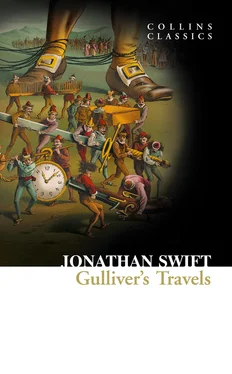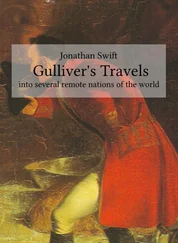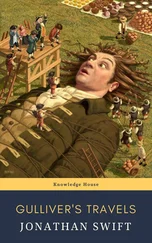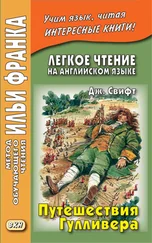An interesting thing to note about Gulliver’s Travels is that this title is not the original. The book was first titled Travels into Several Remote Nations of the World . The author, Jonathan Swift used the pseudonym Lemuel Gulliver, so the title of the novel became abbreviated to Gulliver’s Travels , because that was the phrase used by people in describing the book.
This was a very early novel as it was published in 1726. In fact it is arguably one of the first modern English novels. The term ‘novel’ had only been used since the 1680s and Robinson Crusoe had been published only seven years prior to Gulliver’s Travels . While Robinson Crusoe is essentially a work of realism, Gulliver’s Travels is one of fantasy. That is to say, the former is based on true events and could therefore conceivably happen, while the latter includes fanciful ideas that might be the product of mind alteration, vivid dreams or an extremely fertile imagination. The first two parts of the book find Gulliver in a land of miniature people and then a land of giants. He then visits a land where he speaks with ghosts in the company of an immortal old man, before discovering a place where anthropomorphic horses rule over primitive humans.
Swift’s work of wild experimentation proved him something of a polymath and anthropologist. He was primarily interested in the nature of the human condition, so he used his fantastical imaginings as a way of satirising and revealing the underlying failings of humanity. For an individual living in the early 18th century it was a unique mind that could claim to have that degree of insight. Swift was an Irish Dean, living in Dublin. As a devout Christian he seems to have had something of a chip on his shoulder about scientists. He viewed their work as purely academic and of no practical use, and he pokes fun at science in the third part of the book where he meets a population who although very learned, lack common sense. At that time natural philosophers, as scientists were then known, had begun to unravel the workings of the world. For example, Isaac Newton had expounded his theory of gravity and the composition of white light. These ideas suggested that the world was explainable in a way that didn’t require a god, so such ungodly work was open to ridicule. There is a certain level of hypocrisy on the part of Swift however, as he experiments with concepts of scale and toys with other ideas that were in the public domain as a result of the scientific progress being made at the time.
In regards to the anthropomorphic horses that appear in Gulliver’s Travels , it would seem that he held the notion that due to their dignified silence and work ethic, horses were representative of the more sophisticated qualities desirable in people. At the time, polite society viewed godliness as being as far away from the inner animal as possible. With concepts of evolution still a long way off and an acceptance of primal beginnings, people had the idea that ideal behaviour should be very controlled, restricted and confined, as if the mind were detached from the body.
Swift evidently observed these vulgarities in other people and imagined that if horses could talk, they would portray those characteristics that he viewed as more desirable. Horses were an integral and intimate part of everyday life at the time Swift was writing, although to a modern-day reader it seems a tad esoteric and eccentric to place horses on a pedestal in such a way.
Visit www.AuthorTracker.com for exclusive information on your favorite HarperCollins author.
PART ONE A Voyage to Lilliput
The author gives some account of himself and family; his first inducements to travel. He is shipwrecked, and swims for his life; gets safe ashore in the country of Lilliput; is made a prisoner, and carried up the country.
My father had a small estate in Nottinghamshire; I was the third of five sons. He sent me to Emanuel College in Cambridge, at fourteen years old, where I resided three years, and applied myself close to my studies; but the charge of maintaining me, although I had a very scanty allowance, being too great for a narrow fortune, I was bound apprentice to Mr. James Bates, an eminent surgeon in London, with whom I continued four years; and my father now and then sending me small sums of money, I laid them out in learning navigation, and other parts of the mathematics, useful to those who intend to travel, as I always believed it would be some time or other my fortune to do. When I left Mr. Bates, I went down to my father; where, by the assistance of him and my Uncle John, and some other relations, I got forty pounds, and a promise of thirty pounds a year to maintain me at Leyden: there I studied physic two years and seven months, knowing it would be useful in long voyages.
Soon after my return from Leyden, I was recommended by my good master, Mr. Bates, to be surgeon to the Swallow, Captain Abraham Pannell, commander; with whom I continued three years and a half, making a voyage or two into the Levant, and some other parts. When I came back, I resolved to settle in London, to which Mr. Bates, my master, encouraged me, and by him I was recommended to several patients. I took part of a small house in the Old Jewry; and being advised to alter my condition, I married Mrs. Mary Burton, second daughter to Mr. Edmund Burton, hosier, in Newgate Street, with whom I received four hundred pounds for a portion.
But, my good master, Bates, dying in two years after, and I having few friends, my business began to fail; for my conscience would not suffer me to imitate the bad practice of too many among my brethren. Having therefore consulted with my wife, and some of my acquaintance, I determined to go again to sea. I was surgeon successively in two ships, and made several voyages for six years to the East and West Indies, by which I got some addition to my fortune. My hours of leisure I spent in reading the best authors, ancient and modern, being always provided with a good number of books; and when I was ashore, in observing the manners and dispositions of the people, as well as learning their language, wherein I had a great facility by the strength of my memory.
The last of these voyages not proving very fortunate, I grew weary of the sea, and intended to stay at home with my wife and family. I removed from the Old Jewry to Fetter Lane, and from thence to Wapping, hoping to get business among the sailors; but it would not turn to account. After three years’ expectation that things would mend, I accepted an advantageous offer from Captain William Pritchard, master of the Antelope, who was making a voyage to the South Seas. We set sail from Bristol, May 4th, 1699, and our voyage at first was very prosperous.
It would not be proper, for some reasons, to trouble the reader with the particulars of our adventures in those seas. Let it suffice to inform him that, in our passage from thence to the East Indies, we were driven by a violent storm to the northwest of Van Diemen’s Land. By an observation, we found ourselves in the latitude of 30 degrees 2 minutes south. Twelve of our crew were dead by immoderate labour and ill food; the rest were in a very weak condition. On the fifth of November, which was the beginning of summer in those parts, the weather being very hazy, the seamen spied a rock, within half a cable’s length of the ship; but the wind was so strong, that we were driven directly upon it, and immediately split. Six of the crew, of whom I was one, having let down the boat into the sea, made a shift to get clear of the ship and the rock. We rowed, by my computation, about three leagues, till we were able to work no longer, being already spent with labour while we were in the ship. We therefore trusted ourselves to the mercy of the waves, and in about half an hour the boat was overset by a sudden flurry from the north. What became of my companions in the boat, as well as of those who escaped on the rock, or were left in the vessel, I cannot tell; but conclude they were all lost. For my own part, I swam as fortune directed me, and was pushed forward by wind and tide. I often let my legs drop, and could feel no bottom: but when I was almost gone, and able to struggle no longer, I found myself within my depth; and by this time the storm was much abated. The declivity was so small, that I walked near a mile before I got to the shore, which I conjectured was about eight o’clock in the evening.
Читать дальше












